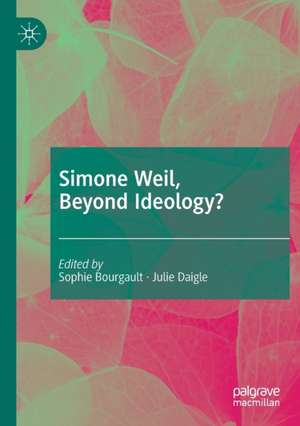Simone Weil, Beyond Ideology?
Editat de Sophie Bourgault, Julie Daigleen Limba Engleză Paperback – 18 dec 2021
| Toate formatele și edițiile | Preț | Express |
|---|---|---|
| Paperback (1) | 709.67 lei 6-8 săpt. | |
| Springer International Publishing – 18 dec 2021 | 709.67 lei 6-8 săpt. | |
| Hardback (1) | 713.69 lei 6-8 săpt. | |
| Springer International Publishing – 17 dec 2020 | 713.69 lei 6-8 săpt. |
Preț: 709.67 lei
Preț vechi: 865.45 lei
-18% Nou
Puncte Express: 1065
Preț estimativ în valută:
135.86€ • 141.22$ • 112.64£
135.86€ • 141.22$ • 112.64£
Carte tipărită la comandă
Livrare economică 06-20 februarie 25
Preluare comenzi: 021 569.72.76
Specificații
ISBN-13: 9783030484033
ISBN-10: 3030484033
Pagini: 252
Ilustrații: X, 252 p. 1 illus.
Dimensiuni: 148 x 210 mm
Greutate: 0.35 kg
Ediția:1st ed. 2020
Editura: Springer International Publishing
Colecția Palgrave Macmillan
Locul publicării:Cham, Switzerland
ISBN-10: 3030484033
Pagini: 252
Ilustrații: X, 252 p. 1 illus.
Dimensiuni: 148 x 210 mm
Greutate: 0.35 kg
Ediția:1st ed. 2020
Editura: Springer International Publishing
Colecția Palgrave Macmillan
Locul publicării:Cham, Switzerland
Cuprins
1. Weil, Political and Ideology.- 2. The Language of the Inner Life.- 3. Let Them Eat Cake: Articulating a Weilian Critique of Distributive Justice.- 4. Simone Weil, Sara Ahmed, and a Politics of Hap.- 5. On Giorgio Agamben's Theoretical Debt to Simone Weil: Destituent Potential and Decreation.- 6. The Political of Rootedness: On Simone Weil and George Orwell.- 7. The Colonial Frame: Butler and Weil on Force and Grief.- 8. Ideology as Idolatry.- 9. Capture Time: Simone Weil's Vital Temporality against the State.- 10. Simone Weil's Heterodox Marxism: Revolutionary Pessimism and the Politics of Resistant.- 11. Labour, Collectivity and the Nurturance of Attentive Belonging.- 12. Thoughts on a Weilian Republicanism.
Notă biografică
Sophie Bourgault is Associate Professor at the School of Political Studies, University of Ottawa, Canada, and current President of the American Weil Society. Her main research interests gravitate toward contemporary feminist theory, care ethics and Simone Weil's political thought.
Julie Daigle is a political theorist whose research focuses on the history of ideas and work of Simone Weil. She has also taught at the School of Political Studies, University of Ottawa, Canada.
Textul de pe ultima copertă
In the last decade, interest in the writings of French philosopher Simone Weil (1909-1943) has surged. Weil is admired for her militant syndicalism, her factory experience and participation in the French resistance, but it is above all the eclectic and rich character of her work that has increasingly attracted scholarly attention. Weil reflected on subjects as diverse as quantum physics, Greek tragedy, bankruptcy, colonialism, technology, education, and religious metaphysics, but perhaps most interesting is the way that her work seems to defy any clear ideological labelling: Marxist, anarchist, liberal, conservative and republican all seem to fall short in describing the complexity of Weil’s thinking. Adding to the interpretive difficulty is the fact that Weil often expressed biting criticisms of most things political. What this edited volume argues is that it is precisely Weil’s unclassifiable nature, combined with her sharp and sometimes ambivalent criticismsof politics, that make her work a most timely and fascinating object of study for contemporary political philosophy. It proposes a two-pronged approach to her thought: first, via a series of conversations set up between Weil and key authors in modern and contemporary political theory (e.g. Sandel, Rawls, Ahmed, Agamben, Orwell); and secondly, via a close study of Weil’s reflections on various ideologies. The goal of this book is not to position Simone Weil squarely within a single ideological tradition but rather to propose that her thought might allow us to critically engage with various ideologies in the history of political ideas.
Sophie Bourgault is Associate Professor at the School of Political Studies, University of Ottawa, Canada, and current President of the American Weil Society.
Julie Daigle is a political theorist whose research focuses on the history of ideas and work of SimoneWeil. She has also taught at the School of Political Studies, University of Ottawa, Canada.
Caracteristici
Provides readers with a careful and sustained study of Simone Weil’s relationship to key ideologies (Marxism, liberalism, republicanism, anarchism, colonialism, nationalism, Nazism) Proposes an original set of conversations between Weil and influential contemporary authors such as Sara Ahmed, Michael Sandel, Giorgio Agamben, Slavoj Žižek, and John Rawls Sheds light on the relevance of Simone Weil’s oeuvre for thinking about pressing contemporary issues such as socio-economic inequalities/unsatisfied basic needs, populism, social alienation, and contemporary labor practices and precarities
